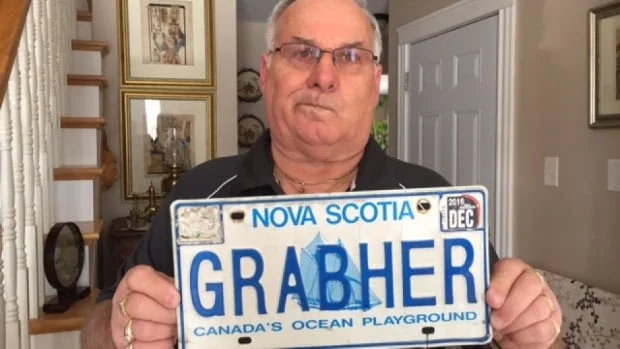theinvestor
DNCanada.ca
We seem to always talk about losing domains but how about license plates?
https://www.cbc.ca/amp/1.6151452

Nova Scotia man loses appeal in 'Grabher' licence plate dispute
Lorne Grabher had his surname as his licence plate for 27 years
A Nova Scotia man has failed in his latest attempt to get his personalized licence plate bearing his surname — Grabher — back from the province.
Lorne Grabher's licence plate was revoked by the province's Registrar of Motor Vehicles in December 2016 after it said the word could be misinterpreted as a socially unacceptable slogan.
That sparked a legal battle that culminated this week with a ruling from the Nova Scotia Court of Appeal. The province's highest court upheld a Nova Scotia Supreme Court decision that Grabher's constitutional rights were not violated by cancelling his plate.
The appeal court decision released Tuesday said Justice Darlene Jamieson made no error in law in her ruling to uphold the province's decision.
N.S. Appeal Court reserves decision on Grabher licence plate dispute
Grabher, who had the licence plate for 27 years, had argued the decision to revoke his plate violated his right to freedom of expression and also infringed on his rights as a Canadian of Austrian-German descent.
The court determined that licence plates are not principally meant for self-expression and there are other avenues open to Grabher, such as bumper stickers.
'Grabher' could be taken as offensive: decision
The court also noted that the same opportunity is not available to everyone, only to those who can condense their message to the seven characters — the character limit on Nova Scotia licence plate.
Those characters are further restricted to numbers and the 26 letters of the Roman alphabet.
The court of appeal said a further restriction on vanity plates is that each one must be unique, so people with common surnames like Smith or LeBlanc would not be able to put their name on a plate.
The court agreed with Jamieson that without the proper context, the word "Grabher" could be taken as offensive to some people.
Grabher was represented in his appeal by lawyers from the Calgary-based Justice Centre for Constitutional Freedoms, the same group whose former president hired a private detective to surveil a Manitoba judge.
But Jay Cameron, the main lawyer representing Grabher in his constitutional challenge, was not involved in hiring the detective.
https://www.cbc.ca/amp/1.6151452

Nova Scotia man loses appeal in 'Grabher' licence plate dispute
Lorne Grabher had his surname as his licence plate for 27 years
A Nova Scotia man has failed in his latest attempt to get his personalized licence plate bearing his surname — Grabher — back from the province.
Lorne Grabher's licence plate was revoked by the province's Registrar of Motor Vehicles in December 2016 after it said the word could be misinterpreted as a socially unacceptable slogan.
That sparked a legal battle that culminated this week with a ruling from the Nova Scotia Court of Appeal. The province's highest court upheld a Nova Scotia Supreme Court decision that Grabher's constitutional rights were not violated by cancelling his plate.
The appeal court decision released Tuesday said Justice Darlene Jamieson made no error in law in her ruling to uphold the province's decision.
N.S. Appeal Court reserves decision on Grabher licence plate dispute
Grabher, who had the licence plate for 27 years, had argued the decision to revoke his plate violated his right to freedom of expression and also infringed on his rights as a Canadian of Austrian-German descent.
The court determined that licence plates are not principally meant for self-expression and there are other avenues open to Grabher, such as bumper stickers.
'Grabher' could be taken as offensive: decision
The court also noted that the same opportunity is not available to everyone, only to those who can condense their message to the seven characters — the character limit on Nova Scotia licence plate.
Those characters are further restricted to numbers and the 26 letters of the Roman alphabet.
The court of appeal said a further restriction on vanity plates is that each one must be unique, so people with common surnames like Smith or LeBlanc would not be able to put their name on a plate.
The court agreed with Jamieson that without the proper context, the word "Grabher" could be taken as offensive to some people.
Grabher was represented in his appeal by lawyers from the Calgary-based Justice Centre for Constitutional Freedoms, the same group whose former president hired a private detective to surveil a Manitoba judge.
But Jay Cameron, the main lawyer representing Grabher in his constitutional challenge, was not involved in hiring the detective.





